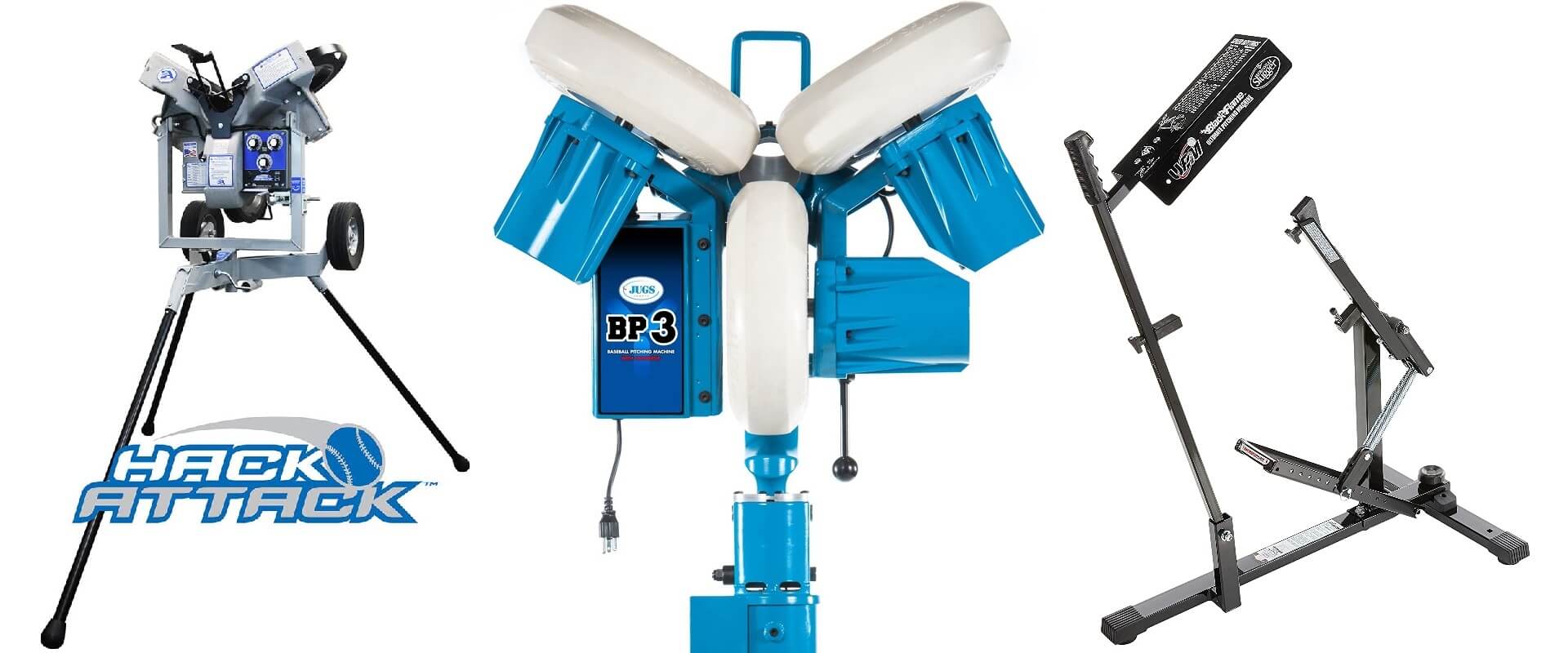Here are 10 of the best baseball pitching machines (2024)
by Fred Hofstetter on January 22, 2024See some of the most common types of pitching machines you can buy, and what you can expect for price vs. quality for youth, adults and pros.
Please keep these few things in mind:
- This is not a complete list. I’ve tried to hit on some of the models that piqued my interest from the biggest/most reputable brands out there.
- I am one person with my own preferences. Do plenty of research. A lot of these come with big price tags and you don’t want to impulse buy any of this stuff. Or base it all off one dude’s opinion.
- A lot of the cons might not be cons for you. If you don’t care much about speed you might not care that it doesn’t throw very hard. Maybe you don’t want a thing hurling 80mph missiles in your backyard.
- I’m erring on the side of a little pricier. There are many cheaper pitching machines you can find on Amazon. But the older I get and the more cheap crap I buy and hate, the more I skip it and just spend the money on something good.
- Consider bundles. Like this. Chances are you might be on the market for more than just a pitching machine. If you want to put together a backyard setup, you’ll need some netting. You might find a better deal on everything in a bundle.
1, 2. Louisville Slugger Blue and Black Flame Pitching Machines
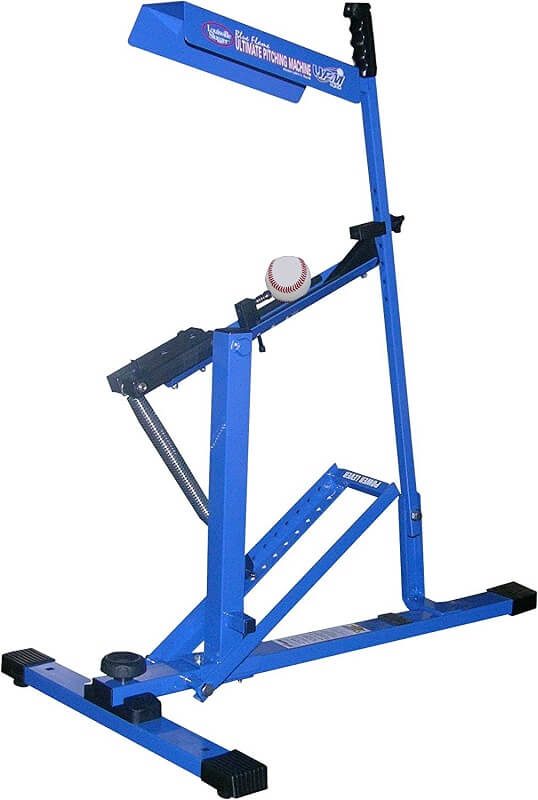
Starting off with the classics. Both of these are traditional mechanical pitching machines with no frills. These will absolutely do the job at lower speeds, though they will require a little more time to set up and calibrate to the type of pitch you’re looking for.
The Black Flame is very similar to the Blue Flame, but it’s a little lighter and throws a little harder (45mph and 50mph, respectively). So the Black Flame costs a few bucks more, but it’s not too many bucks.
I’d recommend this one for very young kids first learning to hit – or for slowpitch softball where you just don’t need a ton of speed or precision to just fit in a few reps before a beer league game. And don’t want to deal with a pitcher who’s already thrown back a couple and can’t find the plate.
Pros
- Very affordable
- Portable and cordless
- Great for youth teams
- Can also use for fielding drills
Cons
- Only throws up to 45-50mph
- Must be secured to the ground: not a good option for blacktop
- Not as precise as more expensive models with tighter controls
Blue Flame – Amazon Black Flame – Amazon
3. BSN Bulldog Softball Pitching Machine
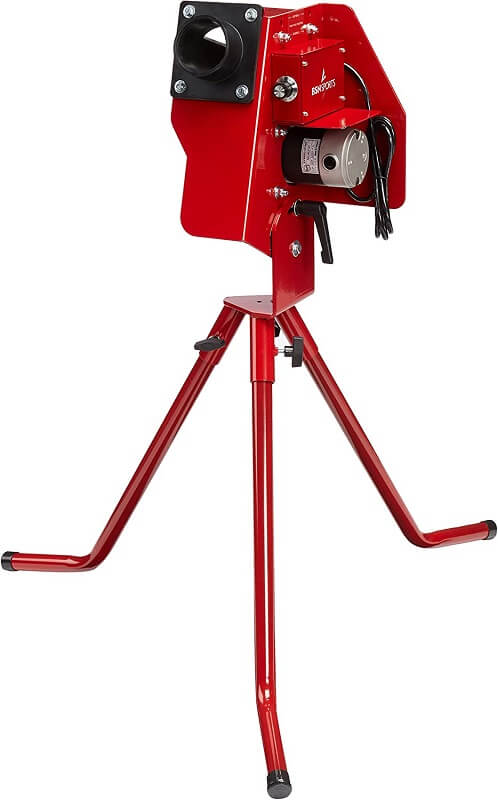
This single-wheel powered pitching machine represents a mid-tier step up from the cheaper mechanical machines that won’t completely break the bank (under $1K as of writing).
This one will get you up to 30-60mph and can be quite a standard-of-living upgrade over something like the Louisville Blue/Black Flame.
We’re not yet at the price point where we start talking autofeeders or pitch selection, but this is a great option at the youth level.
Pros
- Big improvement in usability over manual pitching machines
- Not a huge price tag
- Easy height control
- Use baseballs or softballs
- More lightweight than many powered machines
Cons
- Not enough speed for high schoolers
- Must be hand-fed; no autofeeder
4. PowerNet Launch F-lite Baseball and Softball Pitching Machine
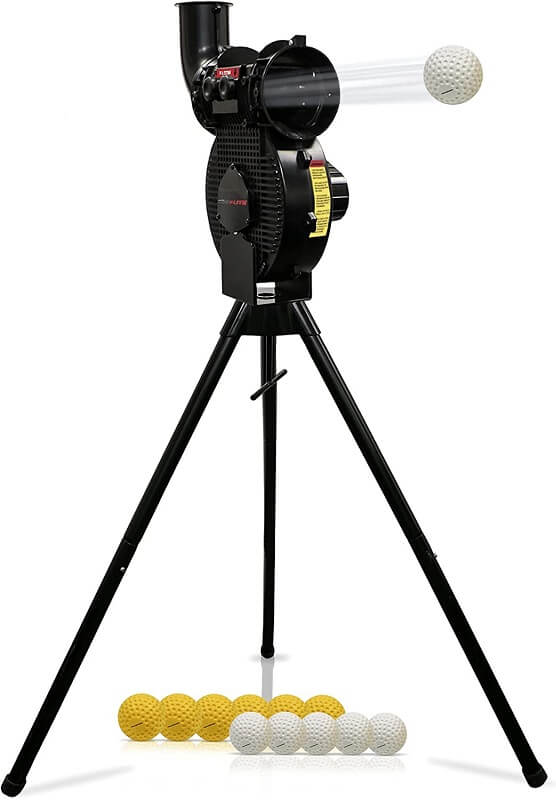
There aren’t a ton of options at this price range ($399 as of writing).
The plastic construction, while it might be less durable, is also a lot lighter and probably much easier to deal with than huffing around some of the beefier steel machines.
While you do need to use PowerNet’s proprietary F-lite balls, you can adjust for either baseball or fastpitch softball.
Pros
- Good value for the money
- Very good reviews for the price
- Adjustable for both baseball and softball
- Can also use for fielding drills
Cons
- You need to use their balls
- Must be manually fed
- Plastic construction isn’t as durable as others highlighted here
5. JUGS BP1 Pitching Machine
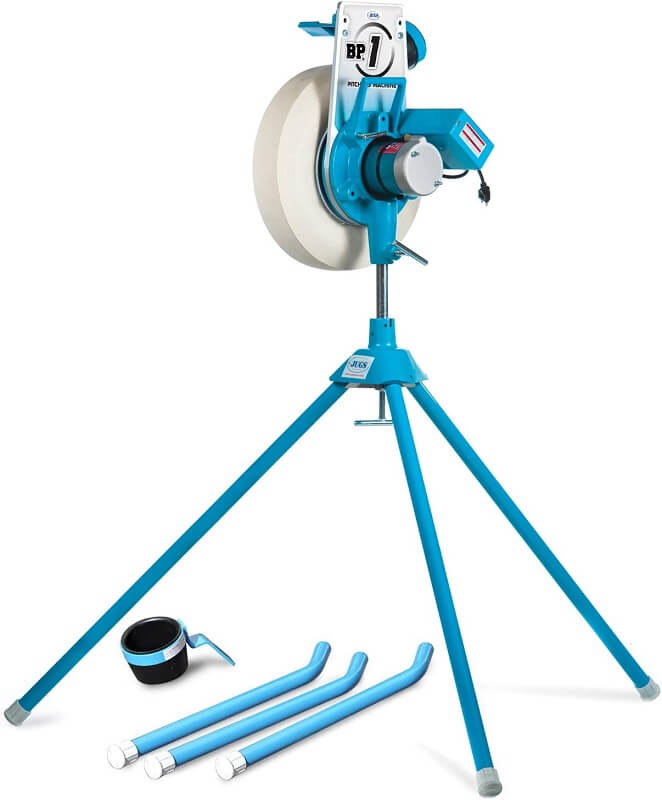
Here’s one from one of the best pitching machine manufacturers out there – JUGS.
This one comes with two sets of legs so you can set the best pitching height for whatever you’re practicing, including regular overhand pitching or underhanded fastpitch softball.
The single-wheel design swivels 360 degrees and allows you to launch at variable heights, so you can also use this for fielding drills, fly balls, pop-ups, grounders, etc.
That’s really the use case for this machine given its high price: this is not generally going to be used for personal use unless you’re ready to seriously splurge on your favorite kid. This is a machine designed for heavy team use in many applications.
Pros
- Digital display for fine-tuning MPH
- Can use both baseballs and softballs
- 360 degree swivel for multipurpose use
- Extremely durable design from a manufacturer with a great reputation
- Portable and relatively lightweight given the quality of the materials and durability
Cons
- High price tag
- Must be plugged in
- Only throws up to 70mph; might be on the low side for higher level players
- No curveballs
6. Zooka Pitching Machines

These make the list as one of the best battery-powered cordless pitching machines you’ll find. A lot of high-quality pitching machines need to be plugged into a standard outlet or generator to work.
Those that don’t need to be plugged in typically must be manually fed. You’ll have to pay extra, but they do offer an additional autoloader which holds up to 16 baseballs or 18 tennis balls.
You can throw up to 500 pitches at the max speed of 70mph before having to charge the battery. That’s not a bad workload for a cordless machine.
That being said it’s still limited to 70mph and isn’t designed for the pros. This is a much better option at the youth level; they say it’s most suitable for 5-18 year olds.
Plus, these just plain look cool. There’s no exposed moving parts and they look like a big nerf gun.
Pros
- Sleek cordless design
- Good battery life
- No exposed parts, very safe
- Short or tall tripod options available
Cons
- Expensive
- Autofeeder must be purchased as an addition
- No softballs
7. JUGS Small Ball Pitching Machine
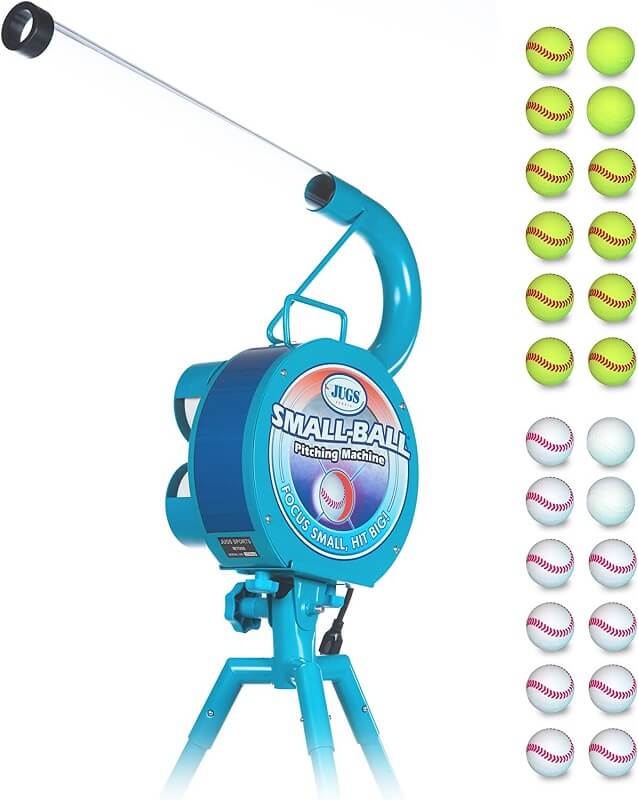
Here’s a potential option for kids in smaller spaces or backyard in a home environment.
The JUGS Small Ball uses 5 inch, 5 ounce polyurethane balls that are about half the size of a regular baseball. So they’re not normally going to do quite as much potential damage should one go wayward.
I like the option to practice with smaller balls. Know how batters will put a weight or two on their bat in the on-deck circle so the normal bat feels light as a feather? There’s a similar effect here. Take a bunch of swings at golf balls and a normal baseball looks like a beach ball.
Pros
- Usable for home use
- Good for kids, especially for drills
- Smaller balls for stress testing hand-eye coordination
- Manual and automatic feeding options
- Sneaky fast – up to 75mph
Cons
- Smaller balls – it’s a niche option
- On the pricey side, for a niche option
8. Iron Mike pitching machines
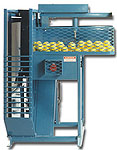
These are the machines you’ll usually find at commercial batting cages and more permanent baseball training facilities. When I was a kid I remember these in the batting cages at the local bowling alley/sports bar. The classic hopper-fed unit with the robotic arm release that feels a little bit like a ball actually being pitched to you.
While they do offer a few different machines, including one for youth/kids you could use in the backyard, Their flagship arm style machines are the MP-6 and MP-4 hopper-fed machines built for team use and capable of throwing up 85mph.
If you’re really looking for the best of the best, Iron Mike is the way to go. But you will absolutely pay for it. As I write this, their cheapest model, ideally used for youth training or slow pitch softball, is listed at $1,450. Their top-of-the-line MP-4 is listed at a chunky $3,985.
This isn’t the birthday gift you get your nephew because he’s starting to learn how to swing a bat. However, if you’re investing in a training facility or batting cages, Iron Mikes are as good as it gets.
Iron Mike machines are not a normal retail item. It appears they have a few authorized online dealers, including Hitting World, which is linked below—but you can also order directly from their website.
Pros
- Top of the line; highly reputable manufacturer with an excellent reputation
- Realistic arm style delivery
- Hopper-fed for infrequent reloading
- Great for commercial use
- Fine for baseball and softball
Cons
- Very expensive
- Not portable – these are machine you install in a permanent spot
Order direct Order through Hitting World
9. Hack Attack Baseball Pitching Machine
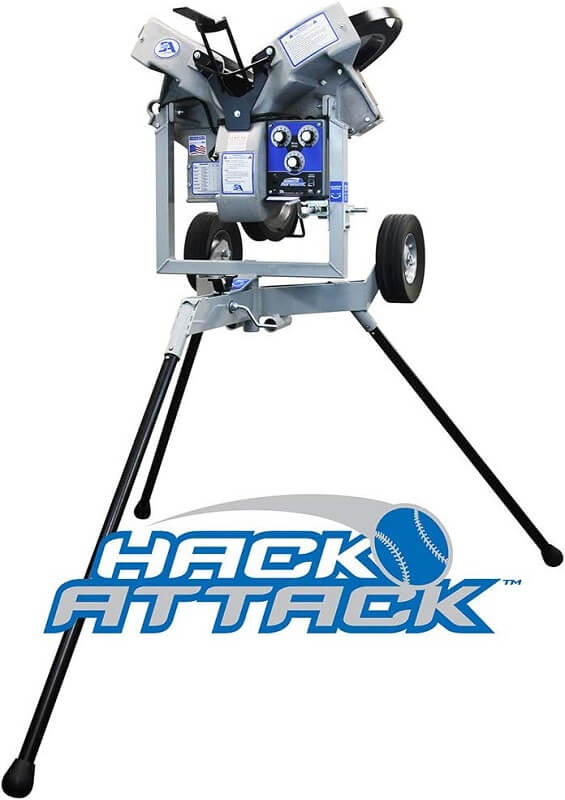
This thing is a beast.
If you’re looking for the highest-level batting practice with the highest speeds and most types of pitches, this is what you’re after. This one is built for the pros.
Does everything. Curveballs, sliders, and event splitters. Up to 100mph. The three-wheel design roughly simulate the three+ fingers a pitcher places on each side of the ball.
There are loads of features to help you create precise, repeatable pitches to get reps in a target area.
The Hack Attack is as good as it gets if you’re ready to invest in the best batting training tool you can buy.
Pros
- Up to 100mph
- Choose from several pitch types
- Built tough: will last you a long time
- Surprisingly portable given its size
Cons
- It’s top-of-the-line and the price reflects it: big price tag
- Requires a lot of power and must be plugged in
10. JUGS BP3 Baseball Pitching Machine

Want the best you can get and don’t care about the cost? Break the bank on this bad boy.
This JUGS machine does everything you could possibly want, and this: it can automatically switch between fastballs and changeups. That’s something.
This is an expensive, impressive piece of machinery college and professional teams can use to hone their skills.
Pros
- Can throw left or right handed pitches of all kinds: breaking balls, cutters, and changeups
- Extremely repeatable and predictable
- Three-wheel design for realistic ball physics
- Digital display to adjust speed
- Up to 90mph
Cons
- High price
- That’s about it
11. Franklin Sports POP ROCKET Kids Baseball Trainer
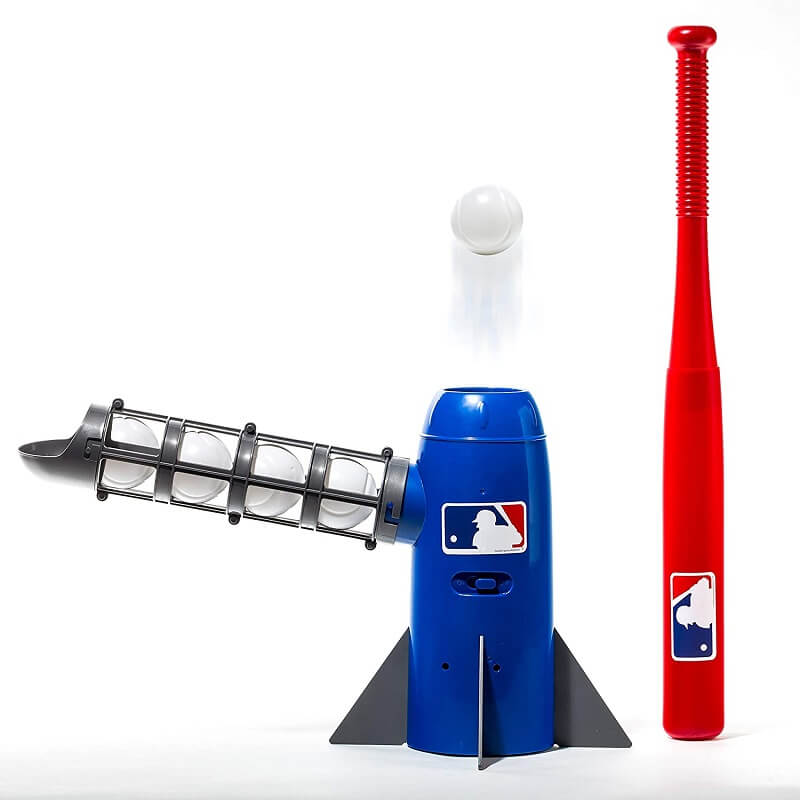
Here’s about as cheap as you can go. A little whiffle ball spitter you can get for a little kid who’s just learning to swing a bat.
This is handy for that tee-ball period where they’re not quite confident enough to toss the ball up for themselves, bring the hand back to the bat, and take a sure swing.
Pros
- Cheap
- Good gift for a young kid
- Helps instill the basics of connecting ball to bat
- If they hate it? So what, it barely cost anything
Cons
- Likely a short lifespan – the kid will learn fast
- I bet those 5 whiffle balls disappear really quickly
Are these things safe for home use?
Yes, or no. Are you a dolt? If yes, no. If no, yes.
How do you plan to practice? Setting up an Iron Mike in the living room in front of the glass patio door? Then no, you are not capable of operating one of these machines safely.
If you are smart, you have nothing to worry about.
Breakdown by category
I’ve attempted to categorize the machines I’ve listed above in some areas that matter.
For youth
For high schoolers
- Hack Attack
- JUGS BP1
- JUGS BP3
- JUGS Small Ball (better warm-up than go-to machine)
- PowerNet Launch F-Lite
- Zooka pitching machines
For little league
- BSN SPORTS Bulldog Baseball/Softball
- JUGS Small Ball
- Zooka pitching machines
- Louisville Slugger Blue Flame
- Louisville Slugger Black Flame
For softball
- BSN SPORTS Bulldog Baseball/Softball
- Iron Mike C-82
- JUGS BP1 (fastpitch)
- Louisville Slugger Blue Flame
- Louisville Slugger Black Flame
- PowerNet Launch F-Lite
For home use / backyard
These are some of the lower octane models that are more realistic in a large backyard, or even garage if you’re using harmless balls.
Go nuts with a fully netted setup and you can use just about anything.
- BSN SPORTS Bulldog Baseball/Softball
- Iron Mike C-82
- JUGS Small Ball
- Louisville Slugger Blue Flame
- Louisville Slugger Black Flame
That throw curveballs
- Hack Attack
- JUGS BP3
- JUGS Small Ball– overhand curves
For batting cages/commercial/pro facilities
Most affordable
Here’s some of the cheaper options you might consider from this list, tiered by price below. All prices as of this writing and are subject to change on the other side of the click.
Keep in mind you can always try to save a buck by shopping for used or reconditioned pitching machines on eBay, Craigslist, or somewhere else.
Under $1,000
Under $500
Under $100
- Don’t even bother
- Unless it’s for a little kid, then maybe the Franklin POP ROCKET or a similar model from another brand
Top of the line / high end / not affordable

The latest articles
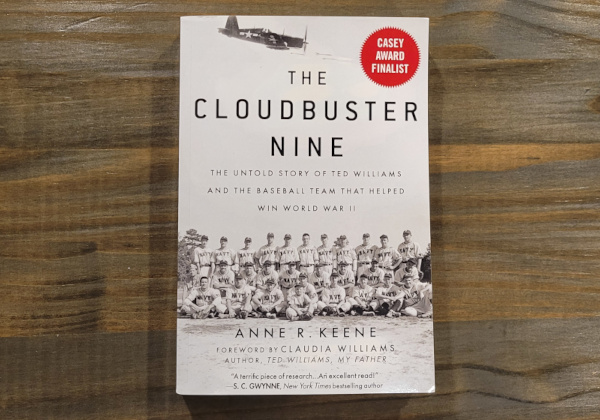
Book Review: The Cloudbuster Nine - by Anne R. Keene
by Fred Hofstetter on January 30, 2024Keene's comprehensive book tells several stories behind the V-5 Pre-Flight School in Chapel Hill, North Carolina: home to one of the rarest, greatest baseball teams in American history.
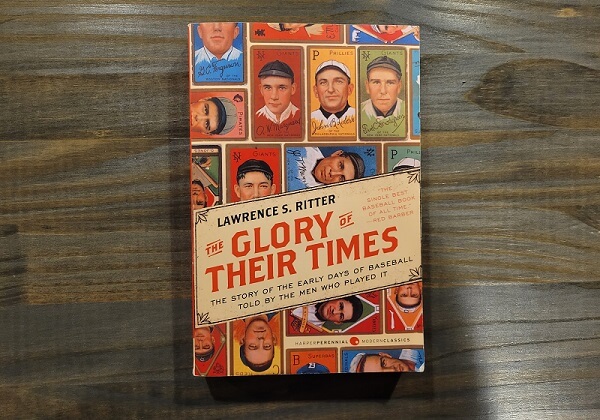
Book Review: The Glory of Their Times
by Fred Hofstetter on February 11, 2023There's good reason why The Glory of Their Times appears on every "best baseball book of all time" list you'll find anywhere.
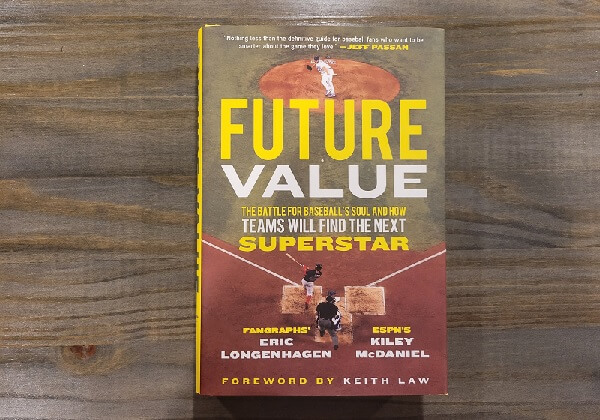
Book Review: Future Value - Eric Longenhagen & Kiley McDaniel
by Fred Hofstetter on January 8, 2023Discover how amateur and pro baseball scouting is done, how departments are built, and how organizations find talent in Future Value.
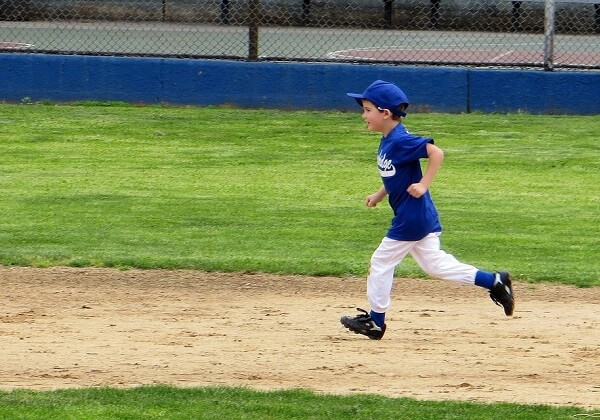
Baseball players wear hats because wearing a hat is correct
by Fred Hofstetter on April 9, 2022Practicality explains why baseball players may want to wear a billed cap. But why does every player always wear a hat? Because it’s the right thing to do.

